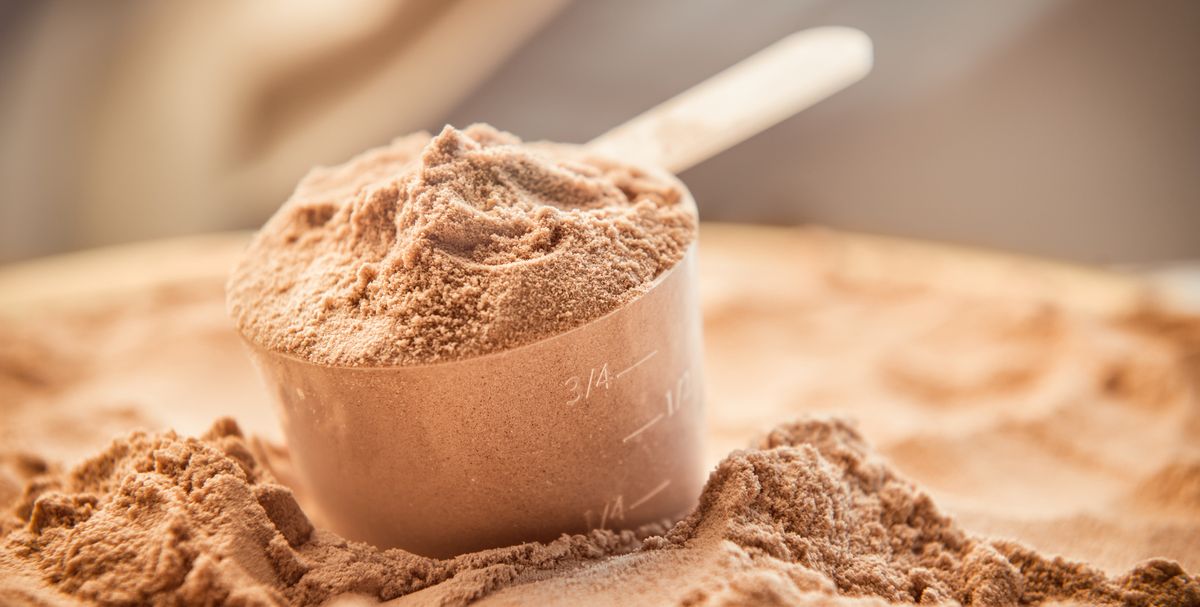Last Updated on April 12, 2024 by Fasting Planet
It seems today like people can’t get enough of taking protein. Although protein is found in many foods, protein powder, shakes, and snacks are still preferable among many. You’d like to be a part of the protein craze yourself, but you’re not sure if you can participate as a vegan. Is protein powder vegan?
Protein powder can be vegan if it’s sourced from soy. Most protein powder though is whey or casein-based, which are both milk byproducts. Vegan proteins such as Garden of Life Raw Organic Protein, Sakara Organic Protein + Greens Super Powder, or Orgain Organic Protein Plant-Based Protein Powder are free of dairy and other animal byproducts.
Ahead, we’ll explain what protein powder is, where it comes from, when it’s vegan, and when it isn’t. We’ll even present a list of some of the most highly recommended protein powders for vegans that you can shop. Make sure you keep reading!
What Is Protein Powder? What Is It Used for?
Protein powder is considered a bodybuilding supplement, but those in athletics such as mixed martial arts and weightlifting often take these supplements as well. As the name alludes, protein powder is rich in protein, a macronutrient chain that can increase one’s muscle mass and possibly increase metabolism.
Ingesting protein powder is valuable for the everyday person as well. Teenagers getting into exercise should supplement with protein since their growing bodies require more protein than adults. If you’ve just started a new workout program as an adult and increasing muscle mass is your primary goal, then start the regimen with protein powder.
Those who were sidelined with an injury who are just getting back into the game should also take protein while they’re recovering so they can heal. Your nutritionist or doctor may have even recommended that you start a protein supplement as you go vegan since you’re losing many protein-filled sources of food.
As we touched on in the intro, protein is in many of the foods the average person eats. These foods include:
- Tofu, split peas, chickpeas, lentils, beans, and other legumes
- Sunflower seeds, sesame seeds, pumpkin seeds, cashews, hazelnuts, macadamias, walnuts, pine nuts, almonds, and other nuts, nut pastes included
- Cottage cheese, other cheeses, yogurt, and milk
- Eggs
- Clams, scallops, oysters, mussels, lobster, crab, prawns, and fish
- Bush birds, goose, emu, duck, turkey, and chicken
- Kangaroo meat as well as pork, veal, lamb, and beef
For many reasons, the above foods may be not allowable on your diet. If you’re watching your weight, you may want to limit your consumption of calorically heavy nuts, dairy, and meats. Vegans and vegetarians can only partake in beans, legumes, seeds, and nuts that contain protein.
That’s why protein powder is so convenient. You dump the protein into a drink, stir, and get on your day without having to worry about scheduling a meal to get your daily dose of protein.
The nutrition of protein powder varies by brand and flavor. According to Plain Nutrition, two scoops of their vegan chocolate protein powder or 30 grams contains the following:
- 148 calories
- 4 grams of total fat (5 percent of your recommended daily value)
- 1 gram of saturated fat (5 percent of your recommended daily value)
- 0 grams of trans fat
- 0 milligrams of cholesterol
- 107 milligrams of sodium (4 percent of your recommended daily value)
- 6 grams of carbs (2 percent of your recommended daily value)
- 3 grams of dietary fiber (12 percent of your recommended daily value)
- 2 grams of total sugars
- 0 grams of added sugars
- 22 grams of protein
- 78 milligrams of calcium (6 percent of your recommended daily value)
- 9 milligrams of iron (50 percent of your recommended daily value)
- 31 milligrams of potassium (1 percent of your recommended daily value)
Is Protein Powder Vegan?
If you’re interested in adding protein powder to your routine, can you as a vegan? If you’re willing to be choosy about the protein powder you buy, then yes.
Manufacturers select three ingredients to make protein powder: casein, soy, or whey. Casein is a type of phosphoprotein from mammal milk. Filled with all the amino acids you need yet your body cannot produce, casein is an attractive ingredient to use for protein powder.
However, it’s not the most popular ingredient due to how you process it. When you ingest protein powder in a shake or as a snack, your body should begin absorbing the powder immediately so you can use it for your workout.
The amino acids in protein powder are dissolved one by one in the bloodstream until there’s nothing left. Depending on where your protein comes from, absorption happens quickly or more slowly. In the case of casein powder, it’s slower. Up to four or five hours after you finish your protein powder, the amino acids are still in your blood.
After taking whey protein powder, it’s dissolved in a little over one hour. That’s due to whey’s water solubility. Whey, which is the liquid byproduct of curdling milk, is considered a complete protein. That means it has all nine essential amino acids.
The third type of protein powder is soy. Of the three, this is the only vegan protein powder, as soy comes from soybeans, a legume grown natively in East Asia. Soy protein powder, while vegan-safe, is the hardest to dissolve in water or another beverage. The taste also isn’t that great, some have said.
However, for vegans who want to increase their muscle mass, soy protein powder is better than nothing!
Our Favorite Vegan Protein Powders
If you’re looking for yummy soy-based protein powder, we’ve got plenty of options to introduce you to. Here is a list of our preferred picks!
Plain Nutrition Chocolate Vegan Protein Powder Blend
We mentioned this vegan protein powder earlier, but we thought Plain Nutrition’s product deserved a spot on this list too. The chocolate flavor proves that soy protein can be just as delicious as protein from whey or casein. With no extra sugar added, this low-cal protein powder includes ingredients like sea salt, stevia, organic cocoa, natural plant-based chocolate flavor, organic hemp protein, organic brown rice protein, and organic pea protein.
These amino acids are included in every two-scoop serving:
- Valine
- Tyrosine
- Tryptophan
- Serine
- Proline
- Phenylalanine
- Methionine
- Lysine
- Leucine
- Histidine
- Glycine
- Glutamic acid
- Cysteine
- Aspartic acid
- Arginine
- Alanine
Sakara Organic Protein + Greens Super Powder
Get your hands on this great protein powder from Sakara, which is called super for a reason. Each serving has 12 grams of protein, yet this powder is non-GMO, dairy-free, gluten-free, organic, and vegan.
Algae within the mix detoxifies while healthful greens alkalize. Per serving, there’s only 1 gram of sugar so you don’t have to worry about a crash when you’re done. Sakara says the flavor of their protein powder is earthy and somewhat sweet and works especially well when added to a smoothie.
Vega All-in-One Plant-Based Protein Powder
One of the best-known plant-based protein powders is Vega’s All-in-One. This vanilla-flavored protein shake is USDA-certified organic with 20 grams of protein per scoop. You’re ingesting nutritional probiotics as well as superfoods and greens like organic pomegranate, blueberries, spirulina, broccoli, kale, and chard.
The ingredients include mushroom powder, bromelain, xanthan gum, bacillus coagulans, citric acid, stevia extract, sacha inchi powder, pumpkin seed protein, sunflower seed protein, maca root powder, chia seed powder, quinoa sprouts, spirulina, natural flavors, agave inulin powder, pea starch, golden flaxseed, acai powder, blueberry juice powder, pomegranate juice powder, lettuce powder, kale powder, chard powder, acerola cherry juice powder, spinach powder, carrot juice powder, and pea protein.
Nuzest Clean Lean Protein
Nuzest Clean Lean Protein is another fantastic vegan protein to consider. You can select from flavors such as Just Natural (unflavored), Smooth Vanilla, Real Coffee, Rich Chocolate, Wild Strawberry, Coffee Coconut with MCTs, Chai Turmeric + Maca, and Vanilla Matcha. Each flavor has zero grams of sugar, 1 gram of carbs, and 20 grams of protein per two-scoop serving.
You’re getting nine amino acids regardless of flavor in higher quantities than the competitor’s protein powder.
Garden of Life Raw Organic Protein
You also have a great variety of flavors with Garden of Life Raw Organic Protein. Choose from chocolate cacao, unflavored, vanilla spiced chai, or vanilla. The chocolate flavor is full of enzymes, live probiotics, fat-soluble vitamins, and branch-chain amino acids or BCAAs. Per serving, there are 22 grams of protein.
The ingredients are a blend of organic carob bean gum, organic guar gum, organic vanilla flavor, organic stevia extract, sea salt, organic erythritol, organic chocolate flavors, and organic cacao. That’s combined with the raw organic protein blend, which includes organic sesame seed sprout, organic pumpkin seed sprout, organic sunflower seed sprout, organic flaxseed sprout, organic adzuki bean sprout, organic lentil sprout, organic garbanzo bean sprout, organic chai seed sprout, organic quinoa sprout, organic cracked wall chlorella, organic millet sprout, organic buckwheat sprout, organic amaranth sprout, organic sprouted brown rice protein, and organic pea protein.
Garden of Life also includes their raw enzyme and probiotic blend with their protein powder, which is Lactobacillus bulgaricus, Lactobacillus plantarum, xylanase, hemicellulase, pectinase, peptidase, papain, lactase, phytase, bromelain, cellulase, beta-glucanase, aspergillopepsin, protease, and lipase.
Orgain Organic Protein Plant-Based Protein Powder
Some of the tastiest vegan protein powder around is undoubtedly Orgain’s. Where else can you buy protein powder flavors like Creamy Chocolate Fudge, Peppermint Hot Cocoa, Chocolate Peanut Butter, or Chocolate Caramel Sea Salt?
The Chocolate Peanut Butter Flavor features Orgain’s organic creamer base with xanthan gum, organic stevia, organic guar gum, organic acacia gum, sea salt, potassium chloride, natural flavors, , organic alkalized cocoa, organic erythritol, organic defatted peanut flour, organic rice brand extract, organic rosemary extract, organic rice dextrins, organic inulin, organic high-oleic sunflower oil, and organic acacia gum.
The Orgain organic protein blend included boasts these ingredients: organic chia seeds, organic brown rice protein, and organic pea protein.
Conclusion
Protein powder is often not vegan, with whey and casein the more popular dairy-based protein sources to use. Yet as we’ve proven in this article, vegans have no shortage of soy protein to shop in so many delicious flavors that taking your protein will feel like enjoying dessert!

